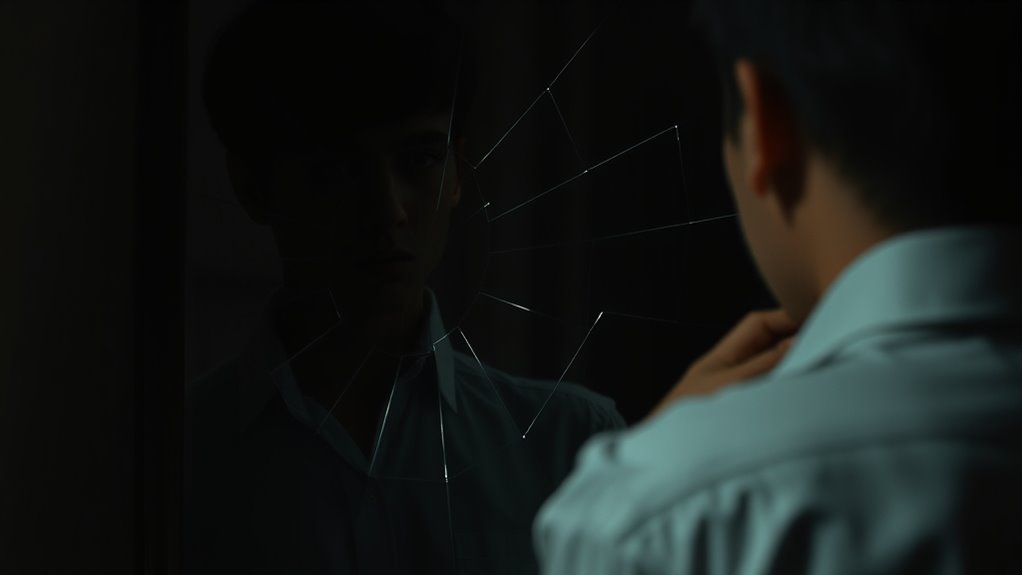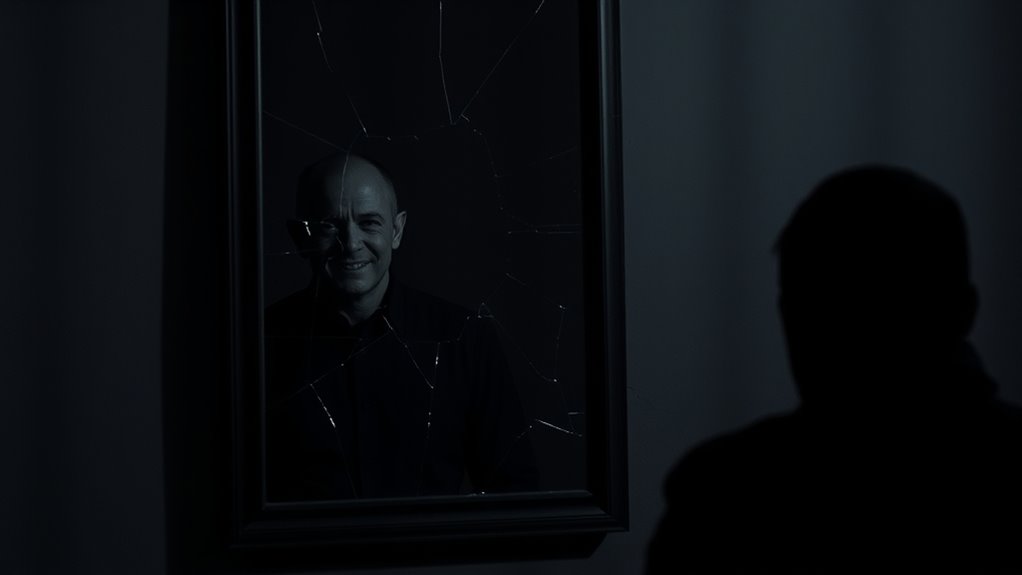Covert narcissists often lack true self-awareness, as their distorted self-perception hides their manipulative tactics and emotional vulnerabilities. They may not fully realize the impact of their actions or recognize their behavior as selfish or harmful. While some may have limited insight, most operate with unconscious motives, using defense mechanisms to mask insecurities. If you want to uncover the deeper layers of their self-awareness and tactics, there’s more to explore below.
Key Takeaways
- Covert narcissists often lack genuine self-awareness about their manipulative behaviors and underlying insecurities.
- They may be aware of their tactics superficially but typically do not recognize the emotional impact on others.
- Their defense mechanisms obscure true self-awareness, helping them avoid confronting vulnerability or shame.
- Many operate on unconscious patterns, unaware of how their actions perpetuate relational damage.
- Some may have limited insight, but overall, they often do not fully understand or intentionally control what they’re doing.
The Hidden Self-Perception of Covert Narcissists

Covert narcissists often have a distorted self-perception that remains hidden from others. You may see them as humble or self-effacing, but inside, they secretly hold an inflated sense of importance. They mask their fragile self-esteem with humility, avoiding challenges that threaten their self-image. Their identity is driven by comparison and envy, making them focus on perceived shortcomings in others to boost their own sense of worth. They fluctuate between negative self-talk, seeking comfort, and covertly craving validation to affirm their superiority. This inconsistent self-view creates contradictions—they present themselves as modest while secretly craving admiration. Their hidden self-perception fuels their manipulative tendencies, as they endeavor to maintain a sanitized, idealized image that conceals their true, often fragile, sense of self. Understanding the causes of these distorted perceptions, such as childhood trauma or societal influences, can help explain why covert narcissists develop this hidden self-view, which is often reinforced by their environment and experiences. Recognizing the role of self-perception in shaping their behavior can also shed light on their difficulty in achieving genuine self-awareness. Moreover, their self-image is frequently unstable, leading to sudden shifts in behavior to protect their fragile ego. Additionally, their self-esteem may appear high to outsiders, but it is often superficial and dependent on external validation.
Awareness of Manipulative Behaviors and Tactics

Understanding how covert narcissists manipulate others requires recognizing their subtle tactics. They often use passive-aggressive behaviors like sarcasm, eye-rolling, or sighs to exert control without confrontation. Social withdrawal helps them avoid judgment or competition, maintaining an illusion of superiority. Playing the victim, whether through helplessness or martyrdom, guilt-trips others into emotional labor. Compliment-fishing involves insincere praise to prompt admiration, while stonewalling—ignoring or blocking communication—serves as a power move. They’re aware that indirect tactics are effective, so they refine these strategies to stay hidden while controlling situations. Their manipulations are often justified as acts of kindness or self-defense, all designed to preserve their self-image while subtly influencing others’ perceptions and actions. Their awareness of their tactics is often heightened by their desire to maintain control and avoid accountability. Recognizing their manipulative behaviors can help in understanding the complexity of their actions and the importance of setting boundaries, especially considering the auditory processing challenges that might influence how they interpret social cues. Additionally, their conscious awareness of these tactics indicates a level of intentionality that can complicate efforts to address their behavior effectively. Some covert narcissists also employ emotional blackmail to manipulate others into compliance, further demonstrating their strategic approach to control.
Emotional Insight and Recognition of Shame

Developing emotional insight in covert narcissists often involves confronting deeply ingrained shame that they may not even recognize. Neurological responses show reduced activity in areas like the right anterior insula and prefrontal regions, impairing their ability to detect emotional cues and understand their own feelings. Hyperactivity in the default mode network leads to excessive self-focused rumination, preventing constructive self-awareness. Defense mechanisms, such as negative self-talk and social withdrawal, help them avoid facing shame directly. They often project their inadequacy onto others or see themselves as victims, reframing shame as external mistreatment. This avoidance keeps them disconnected from genuine emotional insight, making it difficult for them to recognize or accept shame as part of their emotional landscape. Understanding the neurological basis of their emotional processing difficulties highlights why covert narcissists struggle with genuine self-awareness and emotional growth. Additionally, their tendency to mask vulnerability with arrogance or indifference further complicates their capacity for authentic self-reflection. Recognizing these emotional barriers is essential for understanding their limited self-awareness and ongoing emotional challenges.
Perception of Social Interactions and Feedback

Your perception of social interactions can be skewed by biases that reinforce feelings of superiority or victimization. You might interpret others’ actions as personal attacks or dismiss their intentions altogether. This misinterpretation keeps you from forming genuine connections and influences how you respond to feedback. Hypersensitivity to criticism can cause you to react defensively or withdraw, further impairing your social understanding. Additionally, eye patch benefits such as promoting a clearer perception may be metaphorically relevant when considering how biases obscure true intentions. Recognizing how subconscious vibrational states influence your interpretation can help in gaining a more accurate understanding of social cues. Being aware of these cognitive biases can aid in reducing misinterpretations and fostering healthier interactions. Developing an awareness of emotional regulation strategies can also improve your ability to respond thoughtfully rather than react impulsively.
Perception Biases in Interactions
Perception biases heavily influence how covert narcissists interpret social interactions and feedback, often distorting reality to serve their self-image. You might see them dismissing genuine praise as superficial or insincere, always craving more validation. They tend to magnify criticism, viewing even mild feedback as proof of inadequacy. They suspect others have hidden agendas, assuming kindness is transactional or manipulative. Additionally, they rely heavily on external reassurance, constantly seeking approval to stabilize their fragile self-esteem. These biases lead them to:
- Interpret compliments as insufficient or superficial
- Dismiss positive feedback as insincere
- Project ulterior motives onto others’ kindness
- Depend on external validation to feel worthy
- Perception biases heavily influence their interactions and feedback interpretation
This skewed perception keeps their self-view fragile and their interactions complicated. Furthermore, they often lack self-awareness about how their behavior impacts others, which perpetuates misunderstandings and mistrust in their relationships.
Misinterpretation of Others’ Intent
Because covert narcissists often struggle with insecurity, they tend to interpret social interactions through a lens of suspicion and negativity. You might see neutral cues—like silence, eye rolls, or lack of enthusiasm—and interpret them as rejection or disapproval. They often view ambiguous interactions as intentional criticism, which feeds their fear of rejection. Silent judgments become perceived hostility, and others’ happiness at social events is seen as exclusion. To protect themselves, covert narcissists create grandiose fantasies to justify their superiority and may stonewall conversations to maintain control. They tend to avoid vulnerability, misreading kindness or praise as superficial or insincere. This distorted perception reinforces their belief that others are against them, fueling feelings of resentment and further misinterpretation of social feedback. Their perception biases contribute significantly to their misreading of social cues, making it difficult for them to develop healthy relationships. Additionally, their reliance on AI security concepts such as pattern analysis might lead them to overinterpret minor social signals as threats, further distorting their perception of social interactions. Furthermore, their tendency to focus on confirmation bias can cause them to dismiss positive feedback that contradicts their negative worldview. Their distorted perception of social cues may also be influenced by their difficulty in distinguishing between genuine kindness and superficial flattery, leading to mistrust.
The Role of Defense Mechanisms in Self-Understanding

Defense mechanisms play a crucial role in how covert narcissists understand themselves, often serving as shields that distort reality to preserve their fragile self-image. You might see them using tactics like splitting others into “all-good” or “all-bad,” making it easier to dismiss criticism. Projection shifts their flaws onto others, so they never have to face their own shortcomings. Denial and distortion help avoid acknowledging mistakes, while aggression creates emotional distance through volatile behavior. These defenses work together to keep uncomfortable truths hidden, reinforcing a false sense of control. Picture them:
- Dividing people into good or bad, simplifying complex relationships
- Blaming others for their faults through projection
- Ignoring flaws with denial or rationalizations
- Using aggression to intimidate and silence dissent
These defenses mask vulnerability, maintaining their fragile self-perception. Defense mechanisms are among the earliest and most fundamental ways they manage their internal conflicts and protect their ego from painful feelings. For example, they may also employ emotional distancing to avoid confronting their true emotions and fears.
Pathways Toward Self-Awareness and Change

Achieving self-awareness and initiating change in covert narcissists requires intentional effort and targeted interventions. You need to help them develop emotional insight beyond their intellectual understanding, encouraging honest reflection on how their behaviors impact others. Techniques like self-compassion training can reduce shame, making vulnerability easier. Cognitive-behavioral approaches address shame-driven distortions, while therapy focusing on self-concept integration helps bridge their grandiosity and vulnerability. Group settings promote healthy interdependence, offering models for authentic connection. Progress depends on their willingness to challenge defensive mechanisms and replace self-deprecation with constructive self-talk. While change is limited without sustained effort, fostering intrinsic self-worth—beyond external validation—can open pathways for growth. Research indicates that deep-seated shame often underpins narcissistic defenses, making emotional work essential. Understanding the role of emotional insight can significantly enhance therapeutic outcomes. Developing emotional awareness is critical to overcoming defensive barriers and fostering genuine self-understanding. Cultivating self-awareness strategies can enable covert narcissists to recognize their patterns and motives more effectively. Incorporating mentalization techniques can help them better interpret their own and others’ mental states, promoting healthier relationships. Patience and consistent support are essential, as deep-seated shame and dependency require ongoing work.
Frequently Asked Questions
Can Covert Narcissists Ever Recognize Their Patterns Intentionally?
You wonder if covert narcissists ever recognize their patterns intentionally. Usually, they lack awareness of their behaviors because their actions stem from deep-seated shame and low self-awareness. They often operate unconsciously, using defense mechanisms like passive-aggression or self-deprecation without realizing it. While some may have moments of insight, most don’t intentionally recognize or control their patterns, as their behaviors are driven more by subconscious needs than deliberate choices.
How Do Covert Narcissists Perceive Their Own Feelings of Insecurity?
You might see covert narcissists perceive their insecurity as internal struggles they can’t fully control. They often rationalize these feelings, masking them with humility or passive-aggression. While they recognize some of their vulnerability, they tend to view it as a flaw or weakness, not as part of their true self. Their self-perception is complex—they feel anxious and shameful but often deny or minimize these feelings to protect their fragile self-esteem.
Are Covert Narcissists Aware of the Emotional Harm They Cause Others?
Ever wonder if covert narcissists realize the damage they cause? They often deny or rationalize their harmful actions, making it seem like they’re protecting themselves. While they might recognize some patterns in therapy or feel emotional distress, they typically focus on their own pain rather than others’ feelings. Do they truly understand the harm? Usually, their lack of empathy and effort to preserve their self-image prevent genuine awareness of the hurt they inflict.
Do Covert Narcissists Realize They Manipulate Social Situations?
You might wonder if covert narcissists realize they manipulate social situations. Often, they do, using strategic tactics like guilt-tripping, gaslighting, and deflecting blame intentionally to control others. They’re aware of their behaviors, but they frame them as justified or necessary, minimizing harm and normalizing dysfunction. Their actions stem from deep-seated insecurities and trauma, making manipulation a conscious or semi-conscious strategy to protect their fragile self-image.
What Triggers Genuine Self-Awareness in Covert Narcissists?
Like a mirror reflecting a hidden truth, triggers for genuine self-awareness in covert narcissists often come from social setbacks or emotional pain. When manipulation fails, or they face rejection, it’s like hitting a wall that forces them to reconsider their actions. These moments push them to confront internal conflicts, especially when external validation diminishes, and they realize their behavior isn’t sustaining their self-image, sparking the possibility of true self-awareness.
Conclusion
Ultimately, beneath the shadowed surface, covert narcissists may carry a flicker of awareness—like a faint lighthouse guiding them through fog. Though they often hide behind masks, some glimpse their reflection in the stormy waters of their actions. Recognizing this flicker is your first step toward hope, like planting seeds in barren soil. With patience and compassion, change can bloom, transforming darkness into light—a journey from concealment to clarity.










